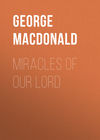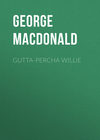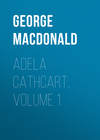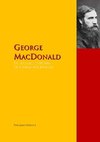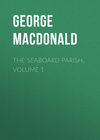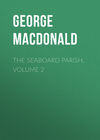Loe raamatut: «Miracles of Our Lord», lehekülg 9
Follows at once the equally wonderful story of his walking on the sea to the help of his disciples. After the former miracle, the multitude would have taken him by force to make him their king. Any kind of honour they would readily give him except that obedience for the truth's sake which was all he cared for. He left them and went away into a mountain alone to pray to his Father. Likely he was weary in body, and also worn in spirit for lack of that finer sympathy which his disciples could not give him being very earthly yet. He who loves his fellows and labours among those who can ill understand him will best know what this weariness of our Lord must have been like. He had to endure the world-pressure of surrounding humanity in all its ungodlike phases. Hence even he, the everlasting Son of the Father, found it needful to retire for silence and room and comfort into solitary places. There his senses would be free, and his soul could the better commune with the Father. The mountain-top was his chamber, the solitude around him its closed door, the evening sky over his head its open window. There he gathered strength from the will of the Father for what yet remained to be done for the world's redemption. How little could the men below, who would have taken him by force and made him a king, understand of such communion! Yet every one of them must go hungering and thirsting and grasping in vain, until the door of that communion was opened for him. They would have made him a king: he would make them poor in spirit, mighty in aspiration, all kings and priests unto God.
But amidst his prayer, amidst the eternal calm of his rapturous communion, he saw his disciples thwarted by a wind stronger than all their rowing: he descended the hill and walked forth on the water to their help.
If ignorant yet devout speculation may be borne with here, I venture to say that I think the change of some kind that was necessary somehow before the body of the Son of Man could, like the Spirit of old, move upon the face of the waters, passed, not upon the water, but, by the will of the Son of Man himself, upon his own body. I shall have more to say concerning this in a following chapter—now I merely add that we know nothing yet, or next to nothing, of the relation between a right soul and a healthy body. To some no doubt the notion of a healthy body implies chiefly a perfection of all the animal functions, which is, on the supposition, a matter of course; but what I should mean by an absolutely healthy body is, one entirely under the indwelling spirit, and responsive immediately to all the laws of its supremacy, whatever those laws may be in the divine ideal of a man. As we are now, we find the diseased body tyrannizing over the almost helpless mind: the healthy body would be the absolutely obedient body.
What power over his own dwelling a Saviour coming fresh from the closest speech with him who made that body for holy subjection, might have, who can tell! If I hear of any reasonable wonder resulting therefrom, I shall not find it hard to believe, and shall be willing to wait until I, pure, inhabit an obedient house, to understand the plain thing which is now a mystery. Meantime I can honour the laws I do know, and which honest men tell me they have discovered, no less than those honest men who—without my impulse, it may be, to speculate in this direction—think such as I foolish in employing the constructive faculty with regard to these things. But where, I pray them, lies any field so absolutely its region as the unknown which yet the heart yearns to know? Such cannot be the unknowable. It is endless comfort to think of something that might be true. And the essence of whatever seems to a human heart to be true, I expect to find true—in greater forms, and without the degrading accidents which so often accompany it in the brain of the purest thinker. Why should I not speculate in the only direction in which things to me worthy of speculation appear likely to lie? There is a wide may be around us; and every true speculation widens the probability of changing the may be into the is. The laws that are known and the laws that shall be known are all lights from the Father of lights: he who reverently searches for such will not long mistake a flash in his own brain for the candle of the Lord. But if he should mistake, he will be little the worse, so long as he is humble, and ready to acknowledge error; while, if he should be right, he will be none the worse for having seen the glimmer of the truth from afar—may, indeed, come to gather a little honour from those who, in the experimental verification of an idea, do not altogether forget that, without some foregone speculation, the very idea on which they have initiated their experiment, and are now expending their most valued labour, would never have appeared in their firmament to guide them to new facts and realities.
Nor would it be impossible to imagine how St Peter might come within the sphere of the holy influence, so that he, too, for a moment should walk on the water. Faith will yet prove itself as mighty a power as it is represented by certain words of the Lord which are at present a stumbling-block even to devout Christians, who are able to accept them only by putting explanations upon them which render them unworthy of his utterance. When I say a power, I do not mean in itself, but as connecting the helpless with the helpful, as uniting the empty need with the full supply, as being the conduit through which it is right and possible for the power of the creating God to flow to the created necessity.
When the Lord got into the boat, the wind ceased, "and immediately," says St John, "the ship was at the land whither they went." As to whether the ceasing of the wind was by the ordinary laws of nature, or some higher law first setting such in operation, no one who has followed the spirit of my remarks will wonder that I do not care to inquire: they are all of one. Nor, in regard to their finding themselves so quickly at the end of their voyage, will they wonder if I think that we may have just one instance of space itself being subject to the obedient God, and that his wearied disciples, having toiled and rowed hard for so long, might well find themselves at their desired haven as soon as they received him into their boat. Either God is all in all, or he is nothing. Either Jesus is the Son of the Father, or he did no miracle. Either the miracles are fact, or I lose—not my faith in this man—but certain outward signs of truths which these very signs have aided me to discover and understand and see in themselves.
The miracle of the stilling of the storm naturally follows here.
Why should not he, who taught his disciples that God numbered the very hairs of their heads, do what his Father is constantly doing—still storms—bring peace out of uproar? Of course, if the storm was stilled, it came about by natural causes—that is, by such as could still a storm. That anything should be done by unnatural causes, that is, causes not of the nature of the things concerned, is absurd. The sole question is whether Nature works alone, as some speculators think, or whether there is a soul in her, namely, an intent;—whether these things are the result of thought, or whether they spring from a dead heart; unconscious, yet productive of conscious beings, to think, yea, speculate eagerly concerning a conscious harmony hinted at in their broken music and conscious discord; beings who, although thus born of unthinking matter, invent the notion of an all lovely, perfect, self-denying being, whose thought gives form to matter, life to nature, and thought to man—subjecting himself for their sakes to the troubles their waywardness has brought upon them, that they too may at length behold a final good—may see the Holy face to face—think his thoughts and will his wisdom!
That things should go by a law which does not recognize the loftiest in him, a man feels to be a mockery of him. There lies little more satisfaction in such a condition of things than if the whole were the fortuitous result of ever conflicting, never combining forces. Wherever individual and various necessity, choice, and prayer, come in, there must be the present God, able and ready to fit circumstances to the varying need of the thinking, willing being he has created. Machinery will not do here—perfect as it may be. That God might make a world to go on with absolute physical perfection to all eternity, I could easily believe; but where the gain?—nay, where the fitness, if he would train thinking beings to his own freedom? For such he must be ever present, ever have room to order things for their growth and change and discipline and enlightenment. The present living idea informing the cosmos, is nobler than all forsaken perfection—nobler, as a living man is nobler than an automaton.
If one should say: "The laws of God ought to admit of no change," I answer: The same working of unalterable laws might under new circumstances look a breach of those laws. That God will never alter his laws, I fully admit and uphold, for they are the outcome of his truth and fact; but that he might not act in ways unrecognizable by us as consistent with those laws, I have yet to see reason ere I believe. Why should his perfect will be limited by our understanding of that will? Should he be paralyzed because we are blind? That he should ever require us to believe of him what we think wrong, I do not believe; that he should present to our vision what may be inconsistent with our half-digested and constantly changing theories, I can well believe. Why not—if only to keep us from petrifying an imperfect notion, and calling it an Idea? What I would believe is, that a present God manages the direction of those laws, even as a man, in his inferior way, works out his own will in the midst and by means of those laws. Shall God create that which shall fetter and limit and enslave himself? What should his laws, as known to us, be but the active mode in which he embodies certain truths—that mode also the outcome of his own nature? If so, they must be always capable of falling in with any, if not of effecting every, expression of his will.
There remains but one miracle of this class to consider—one to some minds involving greater difficulties than all the rest. They say the story of the fish with a piece of money in its mouth is more like one of the tales of eastern fiction than a sober narrative of the quiet-toned gospel. I acknowledge a likeness: why might there not be some likeness between what God does and what man invents? But there is one noticeable difference: there is nothing of colour in the style of the story. No great rock, no valley of diamonds, no earthly grandeur whatever is hinted at in the poor bare tale. Peter had to do with fishes every day of his life: an ordinary fish, taken with the hook, was here the servant of the Lord—and why should not the poor fish have its share in the service of the Master? Why should it not show for itself and its kind that they were utterly his? that along with the waters in which they dwelt, and the wind which lifteth up the waves thereof, they were his creatures, and gladly under his dominion? What the scaly minister brought was no ring, no rich jewel, but a simple piece of money, just enough, I presume, to meet the demand of those whom, although they had no legal claim, our Lord would not offend by a refusal; for he never cared to stand upon his rights, or treat that as a principle which might be waived without loss of righteousness. I take for granted that there was no other way at hand for those poor men to supply the sum required of them.
X. MIRACLES OF DESTRUCTION
IF we regard the miracles of our Lord as an epitome of the works of his Father, there must be room for what we call destruction.
In the grand process of existence, destruction is one of the phases of creation; for the inferior must ever be giving way for the growth of the superior: the husk must crumble and decay, that the seed may germinate and appear. As the whole creation passes on towards the sonship, death must ever be doing its sacred work about the lower regions, that life may ever arise triumphant, in its ascent towards the will of the Father.
I cannot therefore see good reason why the almost solitary act of destruction recorded in the story should seem unlike the Master. True this kind is unlike the other class in this, that it has only an all but solitary instance: he did not come for the manifestation of such power. But why, when occasion appeared, should it not have its place? Why might not the Lord, consistently with his help and his healing, do that in one instance which his Father is doing every day? I refer now, of course, to the withering of the fig-tree. In the midst of the freshest greenery of summer, you may see the wan branches of the lightning-struck tree. As a poet drawing his pen through syllable or word that mars his clear utterance or musical comment, such is the destruction of the Maker. It is the indrawn sigh of the creating Breath.
Our Lord had already spoken the parable of the fig-tree that bore no fruit. This miracle was but the acted parable. Here he puts into visible form that which before he had embodied in words. All shapes of argument must be employed to arouse the slumbering will of men. Even the obedience that comes of the lowest fear is a first step towards an infinitely higher condition than that of the most perfect nature created incapable of sin.
The right interpretation of the external circumstances, however, is of course necessary to the truth of the miracle. It seems to me to be the following. I do not know to whom I am primarily indebted for it.
The time of the gathering of figs was near, but had not yet arrived: upon any fruitful tree one might hope to find a few ripe figs, and more that were eatable. The Lord was hungry as he went to Jerusalem from Bethany, and saw on the way a tree with all the promise that a perfect foliage could give. He went up to it, "if haply he might find anything thereon." The leaves were all; fruit there was none in any stage; the tree was a pretence; it fulfilled not that for which it was sent. Here was an opportunity in their very path of enforcing, by a visible sign proceeding from himself, one of the most important truths he had striven to teach them. What he had been saying was in him a living truth: he condemned the tree to become in appearance that which it was in fact—a useless thing: when they passed the following morning, it had withered away, was dried up from the roots. He did not urge in words the lesson of the miracle-parable; he left that to work when the fate of fruitless Jerusalem should also have become fact.
For the present the marvel of it possessed them too
much for the reading of its lesson; therefore, perhaps,
our Lord makes little of the marvel and much of the
power of faith; assuring them of answers to their prayers,
but adding, according to St Mark, that forgiveness of
others is the indispensable condition of their own acceptance
—fit lesson surely to hang on that withered tree.
After all, the thing destroyed was only a tree. In respect of humanity there is but one distant, and how distant approach to anything similar! In the pseudo-evangels there are several tales of vengeance—not one in these books. The fact to which I refer is recorded by St John alone. It is, that when the "band of men and officers from the chief priests and Pharisees" came to take him, and "Jesus went forth and said unto them, Whom seek ye?" and in reply to theirs, had said "I am he, they went backward and fell to the ground."
There are one or two facts in connection with the record of this incident, which although not belonging quite immediately to my present design, I would yet note, with the questions they suggest.
The synoptical Gospels record the Judas-kiss: St John does not.
St John alone records the going backward and falling to the ground—prefacing the fact with the words, "And Judas also, which betrayed him, stood with them."
Had not the presence of Judas, then—perhaps his kiss—something to do with the discomfiture of these men? If so—and it seems to me probable—how comes it that St John alone omits the kiss—St John alone records the recoil? I repeat—if the kiss had to do with the recoil—as would seem from mystical considerations most probable, from artistic most suitable—why are they divided? I think just because those who saw, saw each a part, and record only what they saw or had testimony concerning. Had St John seen the kiss, he who was so capable of understanding the mystical fitness of the connection of such a kiss with such a recoil, could hardly have omitted it, especially seeing he makes such a point of the presence of Judas. Had he been an inventor—here is just such a thing as he would have invented; and just here his record is barer than that of the rest—bare of the one incident which would have best helped out his own idea of the story. The consideration is suggestive.
But why this exercise of at least repellent, which is half-destructive force, reminding us of Milton's words—
Yet half his strength he put not forth,
But checked His thunder in mid volley?
It may have had to do with the repentance of Judas which followed. It may have had to do with the future history of the Jewish men who composed that band. But I suspect the more immediate object of our Lord was the safety of his disciples. As soon as the men who had gone backward and fallen to the ground, had risen and again advanced, he repeated the question—"Whom seek ye?" "Jesus of Nazareth," they replied. "I am he," said the Lord again, but added, now that they had felt his power—"If therefore ye seek me, let these go their way." St John's reference in respect of these words to a former saying of the Lord, strengthens this conclusion. And there was no attempt even to lay hands on them. He had astonished and terrified his captors to gain of them his sole request—that his friends should go unhurt. There was work for them to do in the world; and he knew besides that they were not yet capable of enduring for his sake. At all events it was neither for vengeance nor for self-preservation that this gentlest form of destruction was manifested. I suspect it was but another shape of the virtue that went forth to heal. A few men fell to the ground that his disciples might have time to grow apostles, and redeem the world with the news of him and his Father. For the sake of humanity the fig-tree withered; for the resurrection of the world, his captors fell: small hurt and mighty healing.
Daring to interpret the work of the Father from the work of the Son, I would humbly believe that all destruction is for creation—that, even for this, death alone is absolutely destroyed—that, namely, which stands in the way of the outgoing of the Father's will, then only completing its creation when men are made holy.
God does destroy; but not life. Its outer forms yield that it may grow, and growing pass into higher embodiments, in which it can grow yet more. That alone will be destroyed which has the law of death in itself—namely, sin. Sin is death, and death must be swallowed up of hell. Life, that is God, is the heart of things, and destruction must be destroyed. For this victory endless forms of life must yield;—even the form of the life of the Son of God himself must yield upon the cross, that the life might arise a life-giving spirit; that his own words might be fulfilled—"For if I depart not, the Comforter will not come unto you." All spirit must rise victorious over form; and the form must die lest it harden to stone around the growing life. No form is or can be great enough to contain the truth which is its soul; for all truth is infinite being a thought of God. It is only in virtue of the flowing away of the form, that is death, and the ever gathering of new form behind, that is birth or embodiment, that any true revelation is possible. On what other terms shall the infinite embrace the finite but the terms of an endless change, an enduring growth, a recognition of the divine as for ever above and beyond, a forgetting of that which is behind, a reaching unto that which is before? Therefore destruction itself is holy. It is as if the Eternal said, "I will show myself; but think not to hold me in any form in which I come. The form is not I." The still small voice is ever reminding us that the Lord is neither in the earthquake nor the wind nor the fire; but in the lowly heart that finds him everywhere. The material can cope with the eternal only in virtue of everlasting evanescence.
